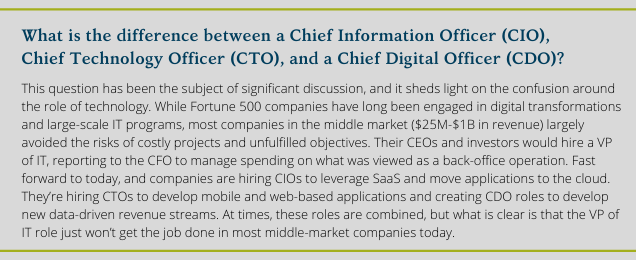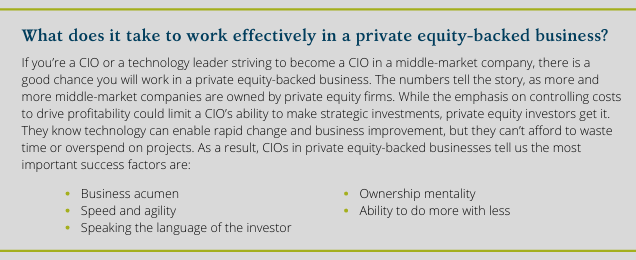In the Crisis and Beyond, The Chief Information Officer Can Make or Break a Company – and its Valuation
When CityMD hired a Chief Information and Digital Officer in early 2019, the role was important, but nobody knew just how critical the role would become. CityMD was poised for significant growth, building on its success as one of the fastest growing urgent care clinic businesses in the country. Global private equity firm Warburg Pincus had recently made a significant investment in the company. And in August, CityMD merged with Summit Health, creating a healthcare provider with 6,400 employees and nearly 200 locations in New York and New Jersey.
Abu Bakar stepped into the Chief Information and Digital Officer role, and a year later found himself at the center of the COVID-19 crisis. Bakar had driven digital transformations at several consumer and retail companies, but healthcare was a new industry for him, and the merger created its own information technology challenges. However, when CityMD stepped up as the leading COVID-19 testing provider in New York City, Bakar knew the demands on CityMD’s technology platform could make or break the company. Developing web and mobile applications to support no-touch check-in and a patient portal allowed CityMD to support twice as much online traffic, and the CIO role proved essential for this essential business.
CIOs have been catapulted into pivotal roles during the crisis, and especially in the middle market.
CityMD was literally at ground zero in the coronavirus pandemic, but nearly every other company around the world has been impacted. And technology has been on center stage. CIOs in middle-market companies like CityMD have been catapulted into key leadership roles during the crisis.
Four Key Trends Elevating the CIO Role
So, what is happening to elevate the role of the CIO? If it were solely related to the COVID-19 crisis, companies could simply ride out the crisis and then go back to business as usual, but we all know that isn’t going to happen. Four trends already in motion are accelerating, and understanding how these trends are elevating the role of the CIO tells the story.

Working from Home
The pandemic and massive shift to remote work reinforced the value of investments in technology and software. The companies that had upgraded their platforms handled this shift relatively easily. As Tim Michel, the CIO of Platinum Equity-backed PrimeSource Building Products commented, “Completing our technology platform upgrade in February allowed everyone to work effectively from home, and our business didn’t miss a beat.” It was the perfect business case supporting the value and importance of investing in technology, and it moved CIOs to the front lines.
SaaS & The Cloud
The explosion of SaaS applications and the ease of moving technology to the cloud allows a CIO to quickly transform a company’s IT platform, streamline the team, and shift the focus from keeping the lights on to contributing to the strategic direction of the company. This shift has allowed some CIOs to make bigger contributions, drive digital transformation efforts, and develop game-changing mobile and web applications.
Data-Driven Business Intelligence
The increasing availability of data and the software to analyze and understand it is driving revenue. Companies are collecting vast pools of data about customers, products, and competitors, and advances in machine learning and artificial intelligence are enabling innovation and profitable growth. The CIO is frequently charged with selecting the right tools and partnering with the business to drive change and improve decision making. This is quickly becoming the key differentiator determining who wins and who loses, and companies with strong CIOs are more likely to win.
Cybersecurity
Risk management and information security have long been important parts of the CIO’s job, but the stakes involved in security breaches and the capabilities of sophisticated hackers are increasing daily. Managing this real and growing threat is becoming more important, and a great CIO who understands how to implement powerful cybersecurity activities can help a CEO (and board members) sleep at night.

Bringing Speed and Agility to the Middle Market
Given the universal nature of these trends, where is the elevation of the CIO role occurring most rapidly? Fortune 500 companies began experiencing these trends several years ago, and in these companies, the CIO is well established as a key member of the senior leadership team. But in the vast middle market, with 30 million jobs and about a third of the U.S. economy, this elevation is accelerating, and private equity investors are driving the market.
In fact, the number of private equity-backed businesses in the U.S. has more than doubled to well over 8,000 over the last decade. Not all companies are the same in the middle market with revenues ranging from $25M-$1B, and 70% of all private equity investments are made in companies with EBITDA of $2.5M-$100M. The larger the company, the more likely the CIO role is evolving as a key member of the leadership team.
Technology is at the heart of how businesses are surviving during the current crisis, and it’s central to how they will thrive in the future.
As one private equity partner who primarily invests in the lower middle market told us, “Our businesses typically don’t have a CIO, but maybe we should.” While private equity investors frequently emphasize shorter-term financial performance, the need to make investments quickly in the beginning of the holding period places a premium on CIOs who can move fast. Speed and agility are paramount. Tim Koeneman, the CIO of KKR-backed Novaria Group, now serves in his third successive private equity-backed CIO role. Koeneman emphasized, “You have to move quickly to get the right people on board and launch the projects that are going to have the greatest impact on creating value.”

Driving Success Today and in the Future
The speed of innovation is challenging every company today, and technology is at the heart of how businesses are surviving during the current crisis. It’s also central to how they will thrive in the future. Since technology infrastructure often enables growth, it’s frequently a big factor in company valuations as well. As Alan Welch, partner at middle-market investing firm Carousel Capital put it, “When we ultimately sell the company, the CIO will be one of the key executives in the room, helping the team make the case for the transaction, because technology enables growth and drives valuation.”
As more and more companies are forced to pivot and transform their businesses, the role of the CIO is being elevated. The crisis created a perfect storm, highlighting the opportunities to leverage technology tools and data analytics, and more and more companies are hiring first time CIOs or elevating the role of their CIO to the senior management team.
If you’re a CEO in a middle-market company, this is a call to action to invest in this critical function. And if you’re a technology leader, get ready to step up in your career, and be prepared to succeed in a private equity-backed business. Are you ready?
About the Authors
Rob Tillman is a Managing Partner at DHR and leader in the firm’s Private Equity Practice. He recruits CIOs, CTOs, and CDOs as a member of the Advanced Technology Practice, and he leads the firm’s Global Financial Officer Practice. Rob is based in Phoenix, AZ, and can be reached at 480.565.2645 or rtillman@dhrinternational.com.
Sal DiFranco is the Managing Partner of DHR’s Global Advanced Technology Practice. He leads the firm’s CIO and CTO Practice, recruiting leaders for Fortune 500 and private equity clients. Sal operates from DHR’s Chicago and San Francisco offices and can be reached at 312.782.1581 or sdifranco@dhrinternational.com.
